Sunday, September 25, 2005
Fly With Me
Tuesday, September 20, 2005
The Air Up There
There's something about mountain air. It's crisp and light and refreshing, when not bitterly cold. It's uncommonly clean, almost sanitized, right down to the "Pine-Sol" scent. You don't truly appreciate the difference until you return to sea-level civilization. If the return is rapid, you'll almost choke on the smelly, oppresively thick air.
This weekend, Dawn and I returned to the Alpine Lakes Wilderness east of Seattle for another backpacking trip. This time, our destination was Spectacle Lake, an 11 mile hike in. My dad flew out from Minnesota to join us.
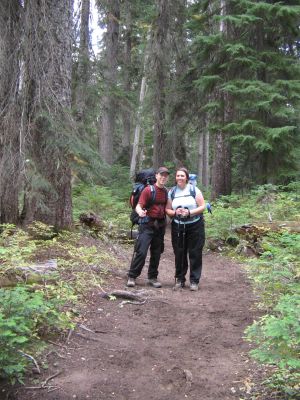
After a 5 hour drive from Vancouver, we began the hike at the Pete Lake Trailhead, elevation 2800. The first four miles followed the Cooper River valley floor, with lodgepole pine towering over wild raspberries, huckleberries, and maple brush just beginning it's fall show:

The trail had a distinctly "horsey" flavor, with piles of equine dung making fancy footwork an occasional neccessity. After four miles, we came across Pete Lake, elevation 3000. While stopping there for a rest, several F-18's came roaring up the valley, passed over the lake, and turned north over Lemah Ridge. What a kick! I'm sure other backpackers were less enthused by the show of raw power than I was.
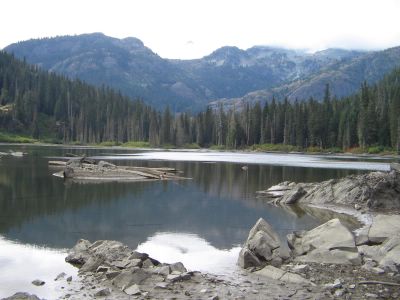
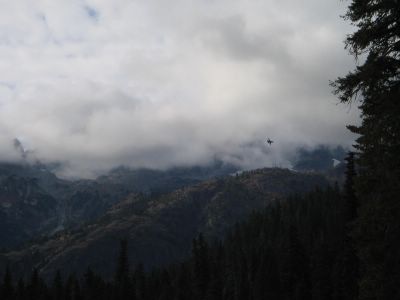
A mile beyond Pete Lake, the trail crosses Lemah Creek. In late summer the water is low, making for an easy crossing. In early summer, this creek would necessitate a tricky ford.
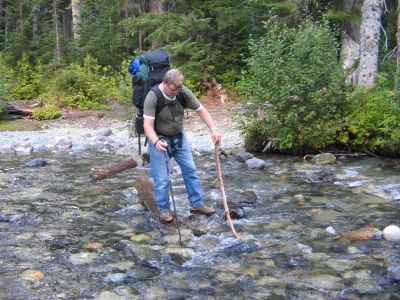
Shortly after crossing Lemah Creek, the trail tees into the Pacific Crest Trail. Taking the PCT southbound, you climb slowly upwards alongside meadows filled with raspberry and huckleberry before beginning a long series of switchbacks up Chikamin Ridge. When the trail straightens to cross Delate Creek below a nice waterfall, the map shows only a short distance remaining before the Spectacle Lake Trail junction. In reality, you have another long set of switchbacks before turning off and descending back down to Spectacle Lake.
By the time we arrived, nightfall was getting close, but there was enough light for us to find a good campsite, set up our tents, and gawk at Lemah Peak tearing at the clouds.
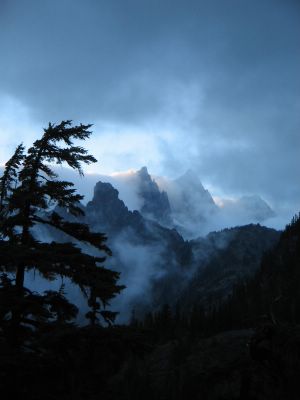
The next morning's light revealed the rugged beauty that surrounds the lake. To the north, Lemah Mountain (center) and Chikamin Peak (far left) dominate the scene. A prominent ridge forms the northeast corner of the lake, and Chikamin Ridge wraps around the lake's west shore from Chikamin Peak to the Three Queens at due south (second picture). The lake's eastern shore falls away to the valley we hiked up, allowing for expansive views of the mountains to the east. Delate Creek cascades from this eastern lip (third picture).
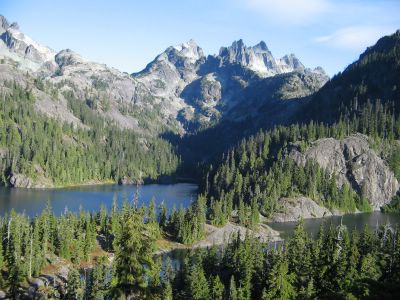
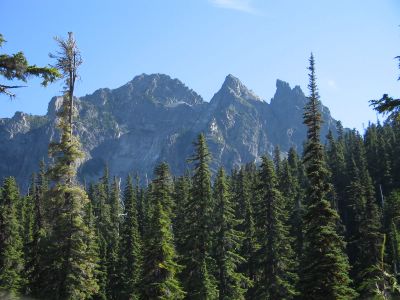
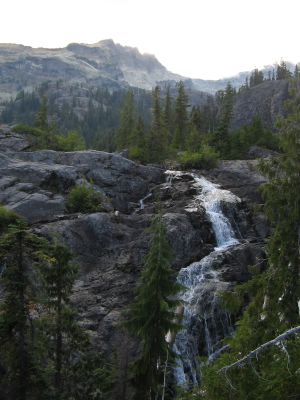
My dad hurt his right knee on the hike in. Heredity and years of carpentry left him with weak knees, and severe pain flared up shortly before we reached the lake. On sunday morning, he was only able to walk several hundred feet before it became too painfull. He decided to rest in camp while Dawn and I went exploring.
Glacier Lake lies several hundred feet above Spectacle Lake in a valley that cuts into Chikamin Ridge. No trails go there, but it looked like the lake might be reachable by walking up its outflow stream. Dawn and I bushwhacked across the southern edge of Spectacle Lake to reach the stream, then rock-hopped up, climbing several gentle cascades. A high waterfall turned us off of the main stream, so we tried to skirt it by following several tributaries that seemed to come from the same general direction. We climbed a few steeper waterfalls, but came up against dead ends. Reaching Glacier Lake would require bushwhacking through thick underbrush on steep terrain; we decided to call it a day. Glacier Lake remained beyond our reach, but it was still pretty fun exploring the valley.
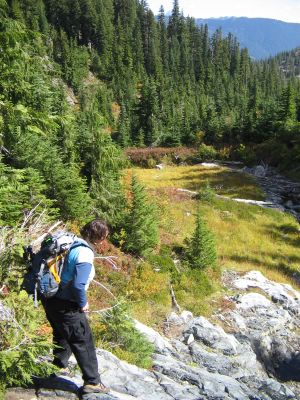
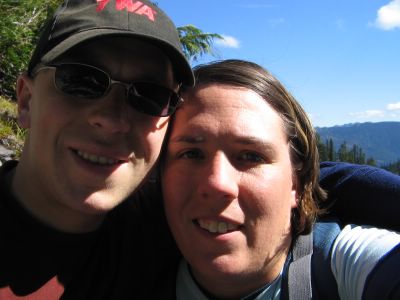
A day of rest left my dad no better off. We were all worried about how he was going to get down the mountain and 11 miles to the trailhead. Upon breaking camp Monday morning, we wrapped his knees with ace bandages, outfitted him with shortened trekking poles, and fortified him with Ibuprofin. Between those measures and some heartfelt prayers, Dad was able to make it down the mountain and to the trailhead using a weird stiff-legged lope. I joked that being German, goose-stepping should come naturally to him.
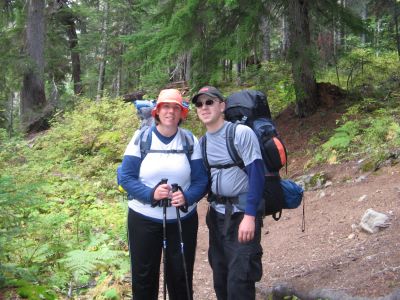
We made pretty good time to Pete Lake, but the last four miles seemed to last forever. Dad was getting tired, making it harder to keep his right leg stiff and swing it clear of the ground. Still, we didn't take much longer hiking out than we took hiking in.
Dad's already talking about starting a training program to strengthen his knees. "I might be getting older, but I'm sure not ready to give stuff like this up," he said. I hope he can come with on another trip next year. In the meantime, this backpacking season is drawing to a close, with enough time for perhaps one short run to Indian Heaven Wilderness. The days are getting shorter, the nights cooler, and the rain more frequent. I'm casting longing looks at the skis gathering dust in a corner of our garage.
I love the Northwest.

Sunday, September 11, 2005
My 9/11 Story
I was not alive during 1941 or 1963 or 1969. I'd never experienced an event while it was burned into the national consciousness. On on a clear September morning in 2001, I did. While the rest of 2001 fades into obscure reaches of my mind, the memory of September 11 still looms sharp and jagged, and I don't know that it will ever recede.
Everybody who recalls the day seems to mention its brilliance and warmth; almost the entire country was blanketed by high pressure systems. The uniformly good weather added to the perception that the horror unfolding on our TV screens was somewhere very close. Most Americans didn't lose friends or family; for most it was at worst a long-ago aquaintence or a friend of a friend. The loss, though, was very personal.
Do you remember waking up on that morning? Picking out your clothes? Making yourself breakfast? I certainly don't, and I miss those memories terribly. They are the very last vestiges of the life before. For most of us, that morning begins at the moment we heard, the moment that bridges the eternal chasm of before and after.
I'm a half-hour early for Aviation Law class at the brick and glass Odegard Hall on the UND campus; I need to work on a project for another class. As I walk into the research center, several students are gathered around the librarian. She has the radio on low and everyone is listening intently to it. It strikes me as vaguely strange, but I don't stop. As I pull my laptop computer from my backpack, several snippets of conversation reach me. I gather they're talking about a plane crash. My first webpage is Yahoo News.
The AP dispatch is only two paragraphs long and is accompanied by a single photo. There is little information other than that an airplane, possibly a USAirways B-737, crashed into the World Trade Center and an evacuation is underway. The photo shows smoke pouring out of a gash in one of towers.
What was your first thought when you heard? The first thing flashing through my mind was: this has happened before! In 1945, a B-25 bomber crashed into the Empire State Building after becoming disoriented in low clouds. I quickly realized, however, that there was no easy way for this to happen under modern radar control in the New York area. Besides, it appeared to be clear weather with unlimited visibility. Could this be intentional? I reloaded the webpage. "SECOND AIRPLANE HITS WORLD TRADE CENTER." Oh my god. The bastards finished what they started in 93.
In shock, I kept updating the AP story, then searched for additional news on the CNN and Fox News websites. They all had scant information, some of which turned out to be wrong. It became quickly clear that this wasn't limited to the World Trade Center; the US was under full-scale attack. Several false reports of car bombings in Washington DC went out before somebody realized another airplane had hit the Pentagon. It was almost time for class; I kept my laptop on as I walked down the hall to the classroom.
When I entered, everybody was talking in hushed tones. "The towers are both down...the second one just collapsed..." I whirled around to catch what my classmate was saying. "They've both collapsed?" I inquired skeptically. Buildings didn't just collapse in the USA, not with thousands of people still inside. My mind flashed back to the previous spring: I was in the jumpseat of a TWA 767 rolling down runway 31L at JFK, the twin towers dominating the skyline beyond the end of the runway. I struggled to reconcile the image with how the scene must look now.
Class began but nobody could concentrate. Everyone who had a laptop with had it turned on, and the others clustered around them, hoping to glean new tidbits of information. The AP was reporting 10 aircraft missing and presumed hijacked. The Sears and Library towers in Chicago and LA were being hurriedly evacuated. I slipped out of the classroom and across the hall to a public telephone, where I dialed my parents' cell phone. They were camping in Hawaii, and due to fly back that day. I left a message: "Mom and Dad...Sam here...I know it's early there but something important is happening...America is under attack...hijacked airplanes have been flown into the World Trade Center and the Pentagon...the trade center has collapsed...possibly over 10,000 dead. They think there might be more planes hijacked. I'll call you later. I love you."
I called my younger siblings at home to make sure they were okay, then rejoined the class. The professor had stopped even trying to teach, and turned on his own laptop. Then we followed the search for United 93, culminating with the news it had crashed in a Pennsylvania field. The military shot it down. They had to. My god, the airline industry is toast. There goes my career. The thought seemed piddling while other hijacked aircraft were still thought to be aloft. Later the world would learn about the passengers on UAL93 and their final charge down the aisle of the doomed 757, how they stormed the flight deck even as Ziad Jarrah rolled the airplane over and screamed Allahu Ackbar through their final plunge.
Those passengers couldn't save their own lives, but they may have spared Washington DC from further terror and loss of life. The military might have intercepted the airplane before it reached its target, but we'll never know. One thing became apparent from the crash of flight 93: Never again will terrorists be able to hijack an airplane and use it for destruction. The passengers would tear them into pieces long before they reached their target.
As everyone filed out of the classroom, a television at the end of the hallway caught my eye. Until now, the events of the morning had played out on my computer screen and in my mind's eye. Now, as I slowly approached, the television replayed the impact of the airplanes and the collapse of the towers in slow motion. The scene was even more hellish than I'd imagined. I stood transfixed by the specter of panicked survivors fleeing the roiling wall of dust and smoke as it tore through the canyons of New York. It was a clear blue day on the prairies of the upper midwest, but my heart was in the ever-blackening chaos of the streets of lower Manhattan that morning.
I don't remember much else that day. Like everyone else, I watched slow-mo replays of each airplane piercing the gleaming towers, disappear slowly into the structure foot by foot, knowing the exact moment at which each occupant of that 767 was perishing. First class, now row 23, now the aft galley. Then the airplane no longer existed, and for a frame or two the scene looked almost peaceful before aluminum, glass, steel, concrete, jet engines, human bodies, and burning fuel exploded out the far side of the building and heralded the arrival of a new day.
Every American identified with some portion of the tragedy that played out that morning. The aviation aspect hit home for me. I'd flown in the flight decks of 757's and 767's, and I knew pilots for American and United Airlines. I could see them preflighting the airplane, pushing back from the gate, rotating for liftoff, easing their seats back on climbout to settle in for a long westbound flight. I saw myself in the right seat as the cockpit door burst open and a young man with a knife lunged at me. Surprised, I tried turning myself around to defend myself but the seatbelt restrained me. I groped behind me for the crash axe, but too late - I feel the knife slice deep into my neck, and I slump helplessly as the life flows out of me.
I talked to a friend and fellow pilot that night, and she exactly voiced my other nagging thought: I feel dirty and used. My whole life had been a love affair with flight. The beauty and joy of flight had continually amazed me, and now it was utterly perverted. You can actually watch the very transformation: Admire the beauty and symmetry of the big Boeing 767, feel its power and grace as it arcs cleanly into the side of the North Tower. Then witness the transformation of this beautiful wonder of technology as it plows through the structure and explodes out the other side. Watching it, I almost felt ashamed to be a pilot.
That night, the nation felt its shock crystallize into a deep rage. At the time it seemed like a fundamental shift in American culture had taken place. Of course, the rage seems almost foreign now; national attention has long since turned away from the events of that morning. You can take that as a condemnation of American values if you wish, evidence of a nation with the attention span of a three-year old. My positive side prefers to see it as a national optimism that can't bear to dwell on painful memories for too long. Collectively, we had to move on.
Personally, though, the memories are still very clear and sharp; I doubt they will fade with time. Truthfully, I don't want them to. I want to cling to every scrap of the day. I want to stand and fight in that 767 cockpit. I want to choke on the dust as I run for my life through the streets of New York. I want to stand paralyzed in front of a TV screen on a small campus in North Dakota and watch slow motion replays under a clear blue sky.
Where were you? Everyone has their own 9/11 story.
Friday, September 09, 2005
Very Cool Pic
Tuesday, September 06, 2005
Helena, Again
Dawn and I flew to Kalispell, MT, over the weekend. We were visiting our friends Jeremy & Crystal. Jeremy instructed with me at ADP, then came to Ameriflight shortly after me. He stuck around after I bailed, and he's already flying the SA227 (Metroliner). I'm sure he'll be a captain at SWA before I get my 1000 turbine PIC hours! Anyways, his Billings-based run is outstationed at Kalispell, and there aren't many more beautiful places you could live.
So the plan for this weekend was to go camping in Glacier National Park. I didn't get back from my trip until late on Friday, so we flew out early Saturday morning. We brought our backpacks and camping gear; my MSR Pocket Rocket propane stove aroused considerable interest at the security checkpoint, since the pot supports are somewhat sharp. This was the shake-out run for the gear we bought during last week's spending spree at REI. Besides the stove, we bought a REI Half-Dome backpacking tent and a lightweight cookset. All told, my pack felt about 10 lbs lighter than our last trip to the Cascades, and all the gear worked great. I really love the new tent.
Despite arriving at the park at 3pm on the Saturday of Labor Day weekend, there were a ton of camping spots available. We picked a nice one, pitched our tents, and headed up the Going To The Sun Road. We drove as far as St. Mary's Lake and did a little hiking at Logan Pass, then headed back to camp for some Jambalaya & sitting around the campfire.
Sunday, we hiked back to Avalanche Lake. I should mention that Crystal is seven months pregnant with their first child, so I was pretty impressed when she set the pace for us. The lake was gorgeous, and despite what the above link says, we saw some rather large cutthroat trout in the clear waters. They were quite aggressive, and we were kicking ourselves for leaving the fishing poles behind.
I'm really looking forward to the 17th. My dad is coming out, and he and Dawn and I will be doing a backpacking trip into the Alpine Lakes Wilderness. I'm keeping my fingers crossed for good weather.
It's Spokane tonight. Yay for BBQ ribs and peach cobbler at Chicken-N-More!
Friday, September 02, 2005
The Blame Game
Well. If that ain't the pot calling the kettle black. For starters, disaster planning happens at the state and local level, not with FEMA. FEMA helps coordinate federal disaster response, at the direction of local authorities, in accordance with the plan. But here we have Ray Nagin on TV talking about how "we're getting a plan together." Excuse me? You're the mayor of a city that sits below sea level, is surrounded by higher water, depends on a levy system designed for a Cat 3 hurricane, and are about a decade overdue for a Cat 4 storm...and you didn't have a plan in place for widespread flooding following a hurricane? I understand, hindsight is 20/20, but these guys are paid to be thinking ahead, and this was not an unimagineable scenario. And then, to deflect attention, they blame a very convenient target: the feds. The media is happy to play along.
Most disaster planners recognize that outside help may not be available for a certain period of time, and plan accordingly. In Florida last year, the hurricane plan provided for three days without federal help. In the area around New Orleans, transportation infrastructure is shattered. I-10 is in shambles. Rail lines are impassible. The airport is largely under water. And three days into the crisis, the locals are screaming that the cavalry was too slow in getting there. Well, shouldn't your plan have anticipated that contingency and provided for some degree of self-reliance?
The cesspool at the Superdome has become the focal point of the media's criticism. Apparently, while first responders were busy rescuing families off rooftops, evacuating hospitals, and trying to avoid getting shot at by the hoods that've been roaming the streets, they also should've figured out how to materialize a convoy of air-conditioned coaches out of thin air, willed them over destroyed streets, and whisked everybody off to Houston. Mind you, the Superdome itself is in a relatively dry area. Nobody was in danger of drowning. Nothing prevented anybody from leaving the rank confines of the Superdome. Indeed, the only reason they were there in the first place was to ride out the hurricane. Katrina was gone by Tuesday morning.
Yesterday CNN's Suzanne Malveaux was interviewing former Presidents George HW Bush and Bill Clinton. She was parotting criticism of the federal government's response when Clinton had the following to say:
CLINTON: Let me answer this. The people in the Superdome are in a special position. And let me say, I've been going to New Orleans for over 50 years. There's no place on earth I love more. They went into the Superdome, not because of the flooding, but because we thought the hurricane was going to hit New Orleans smack dab and they'd be safe in there if they didn't leave town.Finally! Some common sense in all this. Now...can we please get down to continuing the rescue efforts, collecting and burying the dead, and beginning the recovery process? There will be plenty of time for criticism later, for those who seem to be rather inclined.What happened was, when the levee broke and the town flooded, what did it do? It knocked out the electricity and it knocked out the sewage. They're living in hellacious conditions. They would be better off under a tree than being stuck there. You can't even breathe in that place now.
So I understand why they're so anxiety-ridden. But they have to understand, by the time it became obvious that they were in the fix they were in, there were a lot of other problems, too. There were people -- they were worried about people drowning that had to be taken off roofs.
MALVEAUX: So you two believe that the federal response was fast enough?
CLINTON: All I'm saying is what I know the facts are today. There are hundreds of buses now engaged in the act of taking people from New Orleans to the Astrodome in Houston. And you and I are not in a position to make any judgment because we weren't there.
All I'm saying is the way they got stuck there, I see why they feel the way they do. But the people that put them there did it because they thought they were saving their lives. And then when the problems showed up, they had a lot of other people to save. Now they've got hundreds of buses. We just need to get them out.
Thursday, September 01, 2005
Katrina Relief
The blogosphere has mutually decided to devote today to blogging for Katrina relief. I'll not repeat what others have said, other than to urge you to help however you can. An excellent list of humanitarian organizations involved in the relief effort can be found at Glenn Reynolds' Instapundit. Those of you who would like to help with your airplanes or flying skills, AvWeb has the scoop for you.




